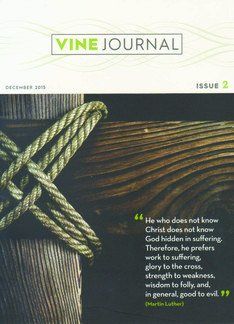This journal replaces The Briefing, which has now ceased publication. Its aim is to stimulate thought on biblical and theological issues and encourage practical application of the same.
Each issue comprises six essays by contemporary Christian leaders, each 2,000-5,000 words in length. The target readership is: keen Christians who want to deepen their knowledge in order to become ‘disciple-making disciples’; theological students; full-time pastors and Christian workers. This journal serves a similar function to Affinity’s Foundations, but is written in a more readable style.
This issue contains the following articles:
1. ‘The theology of the cross for today’, by Mark Thompson. This study is based on Luther’s Reformation theses 19-22, in which he contrasts theologians of glory with theologians of the cross. It is in the dereliction, humiliation and weakness of the cross that we see God truly; he has revealed himself in his crucified Son. This must govern our thinking on Christian ministry and service. The theology of the cross passes judgment on the church when she adopts triumphalist notions and becomes worldly in her methods of presenting the gospel.
2. ‘The cross and the Christian ministry in the New Testament’, by Philip Colgan. This deals with the content and conduct of our ministry. This is in a similar vein to the first essay and based on the opening chapters of 1 Corinthians.
3. ‘One for many’.This is a review of The cross of Christ by John Stott. This study highlights the omission of definite atonement in Stott’s work. Stott fails to explain how it is that one person can die for another. Only a consideration of Jesus as our representative head can give the answer to this and provide a satisfactory explanation of Christ’s substitutionary work.
4. ‘From King’s College to Kingsford’, by Ed Loane. This outlines the work of Charles Simeon at Cambridge and traces his influence upon university Christian ministry in Australia, particularly upon the long-standing and effective ministry of Philip Jensen.
5. ‘Defining and defending marriage’, by Sandy Grant. This deals with the redefinition of marriage about which we are, sadly, much aware at the present time. It is biblically and clearly argued.
6. ‘Clear and good’, by Danny Burlander. This addresses the application of 1 Corinthians 11:2-16, in which Paul sets out the principles of gender recognition in church services. I found this to be helpful reading on the subject. From an insightful analysis of the text, he works through to its application in our various cultural expressions of gender distinction.
Vine journal is well presented and should be a useful tool for thinking Christians. It achieves its purposes of both stimulating the mind and encouraging practical application. Further details from vinejournal@gotherefor.com
Roger March
Wolverton



